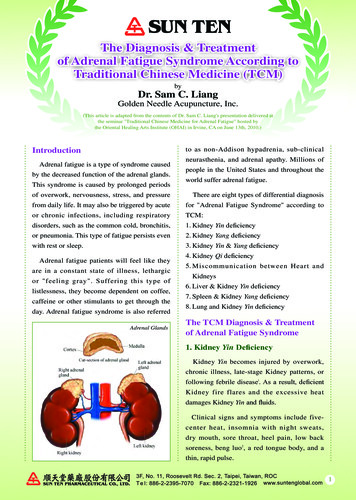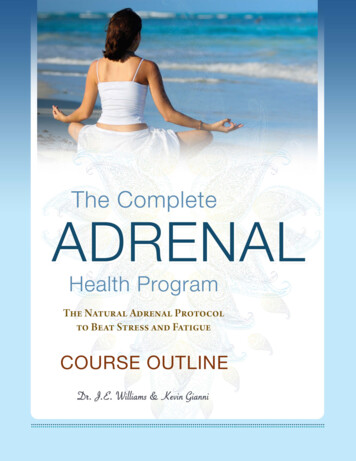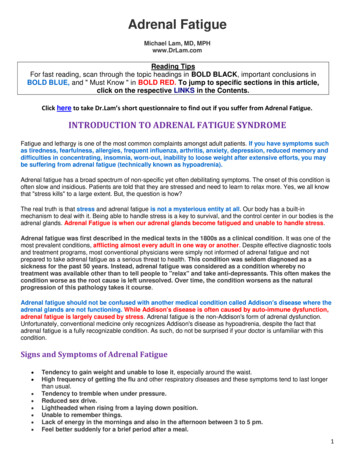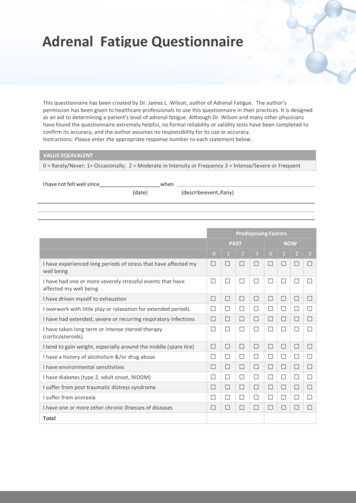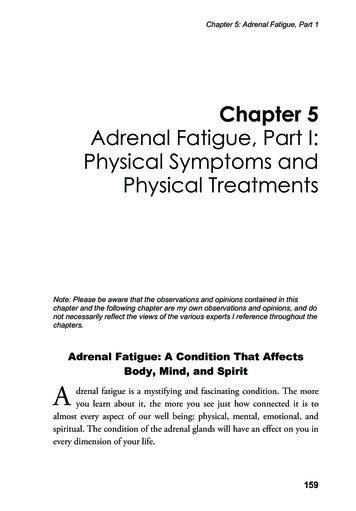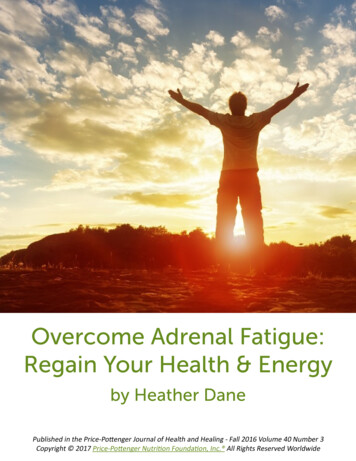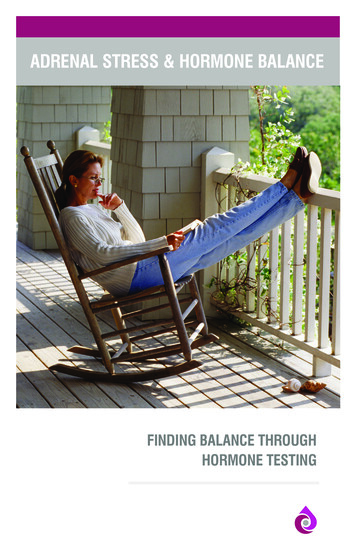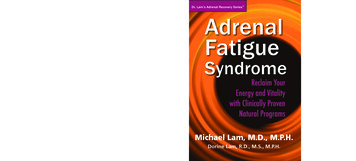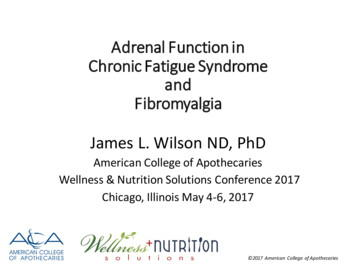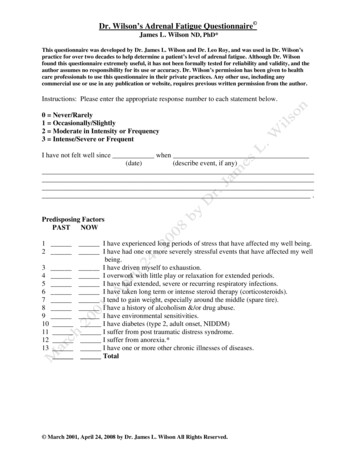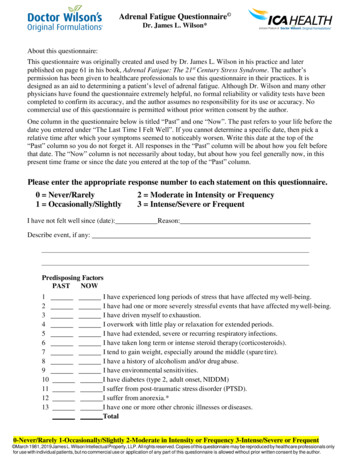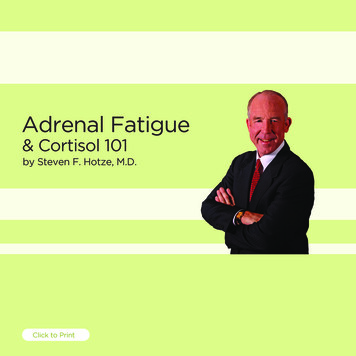
Transcription
Adrenal Fatigue& Cortisol 101by Steven F. Hotze, M.D.Click to Print
IntroductionDr. Hotze is founder of the Hotze Health & Wellness Center andauthor of the book Hormones, Health, and Happiness. He hasenabled thousands of women and men to achieve optimal healthusing his customized 8-Point Treatment Regimen. If you wouldlike a free evaluation regarding your health, you can contact hisoffice by calling 877-698-8698.Notice: This book is intended as a reference guide, not as amedical manual. The information given here is designed to helpyou make informed decisions about your health. It is not intendedas a substitute for any treatment that may have been prescribed toyou by your doctor or therapist. If you suspect that you have amedical or emotional problem, we urge you to seek competentmedical or psychiatric help.The names of those whose cases are presented in this book havebeen changed to preserve their privacy.All rights reserved under all Copyright Conventions.No part of this book may be reproduced, stored in a retrievalsystem, or transmitted by any means, electronic, mechanical,photocopying, recording or otherwise, without written permissionfrom the author.www.DrHotze.com877-698-8698Page - 1www.HotzeHWC.com
ContentsMaggie’s Story: 3Do You Want Your Life Back? 3Maggie’s Treatment 6Adrenal Fatigue: The Cortisol Connection 7The Adrenal Glands: Two Organs in One 8My Background Regarding Cortisol 11The Cortisol Connection 11A Serendipitous Discovery 11Symptoms and Signs of Adrenal Fatigue 13The Adrenal Glands and the Thyroid: Partners in Health 14Adrenal Fatigue and Women 15Adrenal Fatigue and Allergies 16The Importance of Adrenal Support 17Can Stress Be a Good Thing? 19www.DrHotze.com877-698-8698Page - 2www.HotzeHWC.com
Maggie’s Story:Do You Want Your Life Back?Women should feel healthy, vibrant and strong throughout theiradult lives. If you have been told “it’s in your mind” or “live withit,” read on.Maggie is a 43-year old woman who presented to the HotzeHealth and Wellness Center with a seven-year history ofdepression and fatigue, which developed after giving birth to hersecond child. She had a lifelong history of cold hands and feet andsensitivity to cold. She was experiencing significant hair loss, wasconstipated and had severe muscle aching. Even after sleep,Maggie never felt rested.Maggie had experienced recurrent sinus infections andheadaches over the past seven years, for which she had takenantibiotics. She also complained of recurrent abdominal crampingand bloating associated with the ingestion of sugar and breadproducts, which she craved.Since her last pregnancy, Maggie’s menstrual cycles had beenirregular. She had gained 30 pounds over the past seven years andhad difficulty losing weight. She had lost all sexual desire, and feltthat she was in a “brain fog.”Maggie had sought the care of numerous physicians. They toldher that she was “depressed” and prescribed her antidepressants. Afriend, who was a patient at the Hotze Health & Wellness Center,told her that there was a natural alternative treatment for herproblems, so Maggie presented to us for an evaluation.www.DrHotze.com877-698-8698Page - 3www.HotzeHWC.com
Maggie’s name could be easily erased from her chart andreplaced with the names of thousands of other women in midlifewhom we have evaluated. The problems experienced by thesewomen in midlife often stem from hormonal changes, especially acondition known as “estrogen dominance.”Estrogen Dominance First let's understand some basic facts.A woman's ovaries produce three natural estrogen hormones andprogesterone. The production of hormones slows over time so thatby the age of 35, a woman's hormonal production has droppedconsiderably. This decline can occur at any time, at puberty, afterchildbirth, birth control pills or a hysterectomy.Progesterone, the "feel good" hormone, is the first hormone todecline and drops 120 times more rapidly than estrogen. Estrogendominance does not mean that there are high levels of estrogen in awoman's body; rather, it means that the estrogen is not balanced byprogesterone. As progesterone declines and estrogen becomesdominant, symptoms such as breast swelling, uterine fibroids,fibrocystic breast disease, and migraine headaches occur. Atmenopause, the decline in estrogen leads to vaginal dryness, hotflashes, night sweats, as well as mood swings.The Effects of Hormones The female hormones affect everycell in the body, including the brain. It is the female hormoneswhich stimulate the brain to produce serotonin, dopamine, andneurohormones that elevate our moods. When estrogen andprogesterone are out of balance, women often experiencepremenstrual symptoms, such as mild to severe mood swings,breast tenderness, fluid retention, headaches, irregular periods andbreakthrough bleeding. When this occurs women may safely andeffectively supplement themselves with bio-identical hormones torestore hormonal balance. Bio-identical hormones are identical inwww.DrHotze.com877-698-8698Page - 4www.HotzeHWC.com
structure to those created by our bodies. On the other hand, drugcompany counterfeit hormones, such as Premarin, Provera andPremPro, are not identical and often lead to numerous side effects.If they were identical, then they could not be patented andtherefore would prove less profitable. The Women’s HealthInitiative Study demonstrated that counterfeit hormones causeserious side effects.Estrogen Dominance & Hypothyroidism Thyroid hormonesenable our cells to produce energy. Estrogen dominance causes theliver to produce high levels of a protein, thyroid binding globulin(TBG), which binds natural thyroid hormone in the blood,preventing it from being used properly by the cells. This is oftenoverlooked since routine thyroid blood tests taken by mostphysicians do not detect functional hypothyroidism.Some common symptoms and signs of low thyroid includefatigue, cold hands and feet, dry skin, decreased mental sharpness,depression, hair loss, sluggish bowel function and elevatedcholesterol. Women frequently mention that their metabolismchanged after their pregnancy, when they began taking birthcontrol pills or when supplementing with counterfeit hormones.Hypothyroidism is often the culprit.Our goal is to enable our guests to enjoy a better quality of lifeby helping them obtain and maintain health and wellness naturally.This cannot be achieved by using or antidepressants, because lowblood levels of Prozac, Effexor, Zoloft, or any other drug is not theproblem. Good physical and emotional health requires hormonalbalance. This can often be accomplished by replenishing the bodywith the same female hormones that it had to begin with, not drugcompany counterfeits.www.DrHotze.com877-698-8698Page - 5www.HotzeHWC.com
Maggie’s TreatmentMaggie had been made to feel by her doctor that she was ahypochondriac and emotionally inadequate. We explained to herthat her symptoms were very common to women in her age groupand were easily treated. She had an imbalance in her femalehormones that adversely affected her body¹s ability to use thyroidhormones. It was the change in her hormones that triggered herallergy disorder, which in turn led to recurrent sinus infections.The antibiotics which she had taken for her infections also killednormal bacteria in her body and allowed yeast problems to occur.Maggie was prescribed Progesterone, Bi-est (estrogen),Testosterone, Armour Thyroid supplementation, and was treatedfor allergies with sublingual immunizing drops given under thetongue daily. Within two months, Maggie’s depression and fatiguehad disappeared. She was able to discontinue her antidepressants.She told us, “I have not felt this good in years. Thank you forgiving me my life back.”If you want to get your life back, please contact us today at theHotze Health & Wellness Center. It would be our privilege to serveyou.www.hotzehwc.comToll free: 877-698-8698www.DrHotze.com877-698-8698Page - 6www.HotzeHWC.com
Adrenal Fatigue: The CortisolConnectionCortisol is essential to life. Laboratory animals that have had theiradrenal glands removed can no longer produce cortisol, and theyare very fragile creatures. They can function reasonably well iftheir environment is kept perfectly stable. However, even theslightest variation in their environment—a drop in roomtemperature, for example—can spell death for these creatures.With the loss of their adrenal glands, they have lost their ability toadapt.Human beings are not laboratory animals, and the environmentswe live in are seldom stable. We are exposed to a constantonslaught of stressors—noise, pollution, traffic, inclement weather,injuries, illnesses, emotional conflicts, deadlines, and on and on.We may heap stress on top of stress by smoking, eating refinedcarbohydrates, drinking coffee, or going without adequate sleep.Chronic, unrelenting stress, whether physical or psychological orboth, eventually leads to adrenal fatigue. The adrenals simplycannot produce enough cortisol to meet the demands. The result?We feel “stressed out”—because we are.As you might expect, some of the effects of suboptimal cortisollevels are the opposite of those seen with high cortisol levels.Instead of hyperglycemia, or elevated blood sugar, individuals withmild adrenal fatigue often have hypoglycemia, or low blood sugar.Instead of high blood pressure, they may have low blood pressure.Instead of feeling mentally stimulated, they may have troubleconcentrating. But the number one symptom of adrenalinsufficiency is fatigue. Whereas individuals with optimal cortisolwww.DrHotze.com877-698-8698Page - 7www.HotzeHWC.com
levels have energy to burn, those with low cortisol levels dragthemselves through the day, feeling exhausted.If you have adrenal fatigue, you may function reasonably wellwhen your life is stable but fall apart if stress is added. You arelikely to be more vulnerable to infections and to heal more slowlythan those with healthy adrenal glands. You may suffer fromheadaches, heart palpitations, or joint and muscle pain. You maydevelop allergies or chemical sensitivities or experience aworsening of existing allergies or asthma.The Adrenal Glands: Two Organs inOneThe two adrenal glands, which derive their name from theirlocation in the body (“ad” means near; “renal” means kidney), arekey players in your body’s response to stress. Situated on top ofthe kidneys, these pyramid-shaped organs, the size of walnuts, areactually two endocrine glands in one: an inner medulla, whichorchestrates your short-term stress response, and an outer cortex,which mediates your adaptation to chronic stress.www.DrHotze.com877-698-8698Page - 8www.HotzeHWC.com
The pyramid-shaped adrenal glands rest on top of the kidneys. Theinner medulla secretes a short-acting hormone called epinephrine(adrenalin), while the outer cortex secretes cortisol, a hormonewith more prolonged effects.The primary hormone of the medulla is epinephrine, also calledadrenalin. This powerful, short-acting hormone is secreted inresponse to the four E’s: exercise, excitement, embarrassment, andemergency. The flood of adrenaline that is unleashed in thesesituations causes a number of dramatic physical changesthroughout your body: your heart beats more rapidly andwww.DrHotze.com877-698-8698Page - 9www.HotzeHWC.com
forcefully; your pupils dilate; and blood is shunted toward yourskeletal muscles, heart, and brain. Glycogen in your liver isconverted into glucose to be used for quick energy. You may breakout into a cold sweat and begin breathing more rapidly. In short,your body is mobilized for action. This is why adrenaline is knownas the “fight or flight” hormone.Adrenaline’s effects are dramatic and unmistakable, but becausethis hormone does not linger in your body, its effects are alsorelatively short-lived. On the other hand, cortisol, the stresshormone produced by the outer cortex, has more prolonged effectson your body. If adrenaline is like the whip that drives the horsefaster and faster, cortisol is like the rider’s boot, digging into theflank, keeping the horse going even when it’s ready to quit.The primary function of cortisol is to promote gluconeogenesis, theconversion of fats and proteins to sugar (glucose).Gluconeogenesis is an essential component of your body’sadaptation to chronic stress, ensuring that your vital organs,especially your brain, heart, and skeletal muscles, have enoughenergy to meet the increasing workload. In addition, cortisol assistsadrenaline in stimulating the cardiovascular system, increasing theheart rate and pumping capacity and temporarily raising bloodpressure. Cortisol also decreases inflammation, which is why thishormone and its counterfeit derivatives have been used to treatinflammatory conditions, such as allergies, asthma, arthritis, andskin disorders.Due to its metabolic effects, high levels of cortisol can beextremely damaging. People with chronically elevated levels ofcortisol may have high blood sugar and insulin levels and highblood pressure; they may gain weight, especially around theabdomen; and they have a greater risk of heart disease. However,www.DrHotze.com877-698-8698Page - 10www.HotzeHWC.com
just because high levels of cortisol are harmful doesn’t mean thatlow levels are healthy. As with all hormones, balance is the key.My Background Regarding CortisolThe Cortisol ConnectionThe addition of natural, bioidentical hormone therapy to mytreatment regimen made a world of difference for the vast majorityof my patients. But there was still a small group of patients whodid not respond as expected, despite the comprehensiveness of myapproach. Even with the proper balance of estrogen andprogesterone, a small number of female patients still experiencedmenstrual irregularities, anxiety, and depression.Even when taking natural thyroid hormone, some patients withhypothyroidism continued to suffer from low energy and “brainfog.” Even with allergy treatment, some patients still had recurrentsinus infections. And nearly all of them told me that they felt“stressed out.”I was frustrated by my inability to get to the root cause of thesepatients’ health problems and asked myself, “What piece of thepuzzle am I missing?” I knew there must be a common factorunderlying the diverse symptoms that these patients wereexperiencing. Was the common factor stress, or the way theirbodies responded to stress?A Serendipitous DiscoveryIn 1998, I learned that Dr. Broda Barnes had often prescribednatural cortisol along with Armour Thyroid. At that time, I knewlittle about the therapeutic use of cortisol. I knew that it was astress hormone secreted by the adrenal glands. I knew that it hadbeen promoted in the 1950s as a treatment for rheumatoid arthritis,www.DrHotze.com877-698-8698Page - 11www.HotzeHWC.com
but that its use had eventually been supplanted by counterfeitcorticosteroids produced by the drug companies.Like all physicians, I was aware of the potential risks of very highdoses of corticosteroids, which are often prescribed for arthritisand other inflammatory conditions. However, I was not aware thatvery low replacement doses of the body’s most importantcorticosteroid, cortisol, were safe and highly beneficial to patientswith a wide range of symptoms.In medical school I learned about Addison’s disease, a relativelyrare condition in which the adrenal gland is unable to produceadequate cortisol. But there was no mention of mild adrenalinsufficiency or adrenal fatigue, its effects on immunity and on thefunction of other hormones, or its treatment. It was as if thiscondition did not exist.I respected Dr. Barnes immensely, and since I was eager to findways to help the patients who were not responding to mycomprehensive treatment program, I decided to research the topicof natural cortisol replacement. In the fall of 1998, I purchased amedical text named, appropriately enough, Safe Uses of Cortisol.In this book, William McK. Jefferies, M.D., outlined the role of theadrenal glands in the body’s response to stress and documented theconnection between adrenal insufficiency and menstrual problems,infertility, allergies, asthma, rheumatoid arthritis, viral infections,chronic fatigue, hypothyroidism, and other ailments. Throughoutthe book, Dr. Jefferies presented compelling case histories from hisfifty years of experience using natural cortisol.As I read Dr. Jefferies’ textbook, I became increasingly intrigued.Like my other mentors, Dr. Jefferies was a physician whochallenged conventional thought. He recognized that health is awww.DrHotze.com877-698-8698Page - 12www.HotzeHWC.com
continuum from extreme disease to a condition of optimal health.Instead of assuming that only life-threatening adrenal insufficiencymerited attention, he maintained that even mild adrenalinsufficiency could impair health and should be treated.Throughout his book, Dr. Jefferies made a clear - cut distinctionbetween very high pharmacologic doses of counterfeitcorticosteroids, which have severe adverse effects, and physiologicreplacement doses, which safely reestablish the body’s optimallevels of cortisol. He emphasized the difference between thesynthetic, counterfeit corticosteroids produced by drug companiesand naturally occurring cortisol produced by the body. Although hemeasured his patients’ blood levels of cortisol, he did not relysolely on blood tests for diagnosis or treatment. He maintained, asI do, that a patient’s clinical history is the best indicator of adrenalfunction.Symptoms and Signs of AdrenalFatigue Chronic fatigue Low blood sugar (hypoglycemia) Low blood pressure (hypotension) Dizziness or lightheadedness upon standing Muscle and/or joint pain Recurrent infections Allergies and/or asthma Irregular menstrual cycles Infertility Low libido Headaches Hair losswww.DrHotze.com877-698-8698Page - 13www.HotzeHWC.com
Dry skin Anxiety or panic attacks Depression Heart palpitations Difficulty “bouncing back” from stress Cold and heat intoleranceIf you think that many of these symptoms sound similar to those ofhypothyroidism, you’re right. Although they are clinically distinctconditions, adrenal insufficiency and hypothyroidism are bothmetabolic problems that result in a slowdown of the body’sfunctions and a decline in energy. Some people have only one ofthese conditions, but many people have both. If yourhypothyroidism is complicated by adrenal insufficiency, then it’simportant to address this underlying problem at the same time. Letme explain why.The Adrenal Glands and theThyroid: Partners in HealthAs I mentioned at the beginning of this chapter, some patients withhypothyroidism do not regain their energy even when they aretaking natural thyroid. I was puzzled by this phenomenon until Ilearned about Dr. Barnes’s use of natural cortisol and read Dr.Jefferies’ book. Dr. Jefferies had found that adrenal fatigue oftenoccurs in conjunction with hypothyroidism, and that, in theabsence of adequate cortisol, thyroid hormone replacement wasless effective.The reason is that when the adrenal glands are weak, even normalthyroid activity is a burden. Adding supplemental thyroid hormonemay result in initial improvement in energy levels and otherwww.DrHotze.com877-698-8698Page - 14www.HotzeHWC.com
symptoms, but as the adrenal glands become more exhausted,energy production is shut down. The solution is not more thyroidhormone. What is called for is adrenal support with small doses ofcortisol.In my experience, as well as that of Drs. Jefferies and Barnes, lowdose cortisol can make a tremendous difference in the energy andwell-being of patients with hypothyroidism. Not only does itimprove energy, raise body temperature, and increase resistance toinfection, it also helps the body utilize thyroid hormone. Naturalcortisol is especially helpful for patients with autoimmunethyroiditis, an extremely common cause of hypothyroidism that Idiscussed in chapter 6. Like other autoimmune conditions,autoimmune thyroiditis can develop when the adrenal glands arestressed, especially following pregnancy or at menopause. Asdocumented in Dr. Jefferies’ book, natural cortisol actually reduceslevels of thyroid antibodies, enhancing the effectiveness of thyroidhormone.Adrenal Fatigue and WomenLike hypothyroidism, adrenal fatigue affects women much morefrequently than men. The reason women develop estrogendominance is discussed in chapter 1. High levels of estrogen causea corresponding increase in levels of cortisol-binding globulin.Like other hormone-binding globulins, cortisol-binding globulininterferes with hormone function. It circulates in the bloodstream,binds to cortisol, and renders it inactive. A woman with estrogendominance may have adequate levels of total cortisol in herbloodstream, but her free, available cortisol level may be very low.Only free cortisol can pass through cell membranes and activatereceptors inside the cell.www.DrHotze.com877-698-8698Page - 15www.HotzeHWC.com
Estrogen impairs adrenal function in another way: it interferes withthe release of cortisol from the adrenal cortex. In laboratoryanimals, when estrogen levels are high, the adrenal cortex fails torespond to signals from the brain. In other words, even though thebrain is emitting a cry of alarm—“Send more cortisol!”—the glandresponsible for meeting this demand does not “receive” it.Just as estrogen dominance can contribute to adrenal insufficiency,adrenal insufficiency can contribute to estrogen dominance.Cortisol is made in the adrenal cortex from progesterone. Ifprogesterone levels are low, then cortisol levels are likely to be lowas well. Because the body considers cortisol more important tosurvival than progesterone, whatever progesterone is available inthe adrenal cortex is going to be converted into cortisol. Thismeans that a woman whose ovaries are producing lessprogesterone will not be able to call upon her adrenal glands toproduce adequate amounts of cortisol.As we age, our adrenal glands produce less cortisol. Thisinevitably leads to adrenal fatigue to one degree or another.Adrenal Fatigue and AllergiesAdrenal fatigue is also a common underlying problem in patientswith allergies, especially when these allergies have been poorlymanaged. As I explained in chapter 4, out-of-control allergies oftenlead to recurrent sinus infections, which lead to repeated courses ofantibiotic therapy, which lead to yeast overgrowth and impairedimmunity. This cycle of infection, antibiotic treatment, impairedimmunity, and reinfection adds stress to the body, weakening theadrenals, and reducing cortisol levels.www.DrHotze.com877-698-8698Page - 16www.HotzeHWC.com
This in turn worsens allergies, because cortisol is the body’santiallergy hormone of choice. Cortisol is both a naturalantihistamine and a natural anti-inflammatory. Prednisone,dexamethasone, and other high-dose counterfeit corticosteroidsthat are used to alleviate the inflammation of bronchial asthma,rheumatoid arthritis, and other autoimmune conditions are simplythe drug companies’ counterfeit versions of the body’s own naturalanti-inflammatory hormone, cortisol.Though I don’t prescribe cortisol to every patient with allergies, Ihave found that those with long-standing, unmanaged allergies areusually suffering from adrenal fatigue. The addition of cortisol totheir treatment regimen lessens the likelihood of recurrent sinusinfections and helps them regain energy more quickly.The Importance of Adrenal SupportThe use of physiologic, subreplacement doses of cortisol hasproven to be a godsend for many of my patients with these andother conditions. A young, healthy person produces 20–30 mg ofcortisol per day. My starting dose of slow-release biologicallyidentical cortisol is 1.25–2.5 mg per day, and I adjust the dosageincrementally as symptoms warrant. Along with this, I alsorecommend that patients take dehydroepiandrosterone (DHEA),another hormone produced by the adrenal glands. The amount ofDHEA produced by the adrenal cortex is greater than that of any ofthe other adrenal hormones, including the androgens(androstenedione and testosterone) and the estrogens (estradiol,estrone, and estriol).Levels of DHEA and its derivative, DHEAS, peak in youngadulthood and then begin to decline. By the age of seventy, yourDHEA level may be less than a fifth of what it was at the age ofwww.DrHotze.com877-698-8698Page - 17www.HotzeHWC.com
twenty. In elderly adults, higher levels of DHEA correspond withbetter health and longevity. When blood levels are low,supplemental DHEA often enhances energy, immunity, and libido.Levels of DHEAS, a blood marker of DHEA status, peak aroundage seventeen in women and age twenty-two in men. After the ageof thirty, levels of DHEAS decline about 2 percent per year.A healthy diet is also important for anyone with adrenalinsufficiency. If low blood sugar is a problem, you may find ithelpful to eat several small meals during the day. Make sure toinclude adequate protein and reduce or eliminate refinedcarbohydrates, caffeine, and alcohol, all of which stress the adrenalglands.www.DrHotze.com877-698-8698Page - 18www.HotzeHWC.com
Nutritional supplements are also vital. You can find more on thisimportant topic in appendix C, but for now, I want to mention onenutrient in particular that is crucial to healthy adrenal glands:vitamin C. The adrenal cortex has the highest concentration ofvitamin C of all the organs in the body, and the cells of this glanduse it at a higher rate than any other cells. Vitamin C enhancesimmunity, which is often impaired in those with adrenalinsufficiency. During times of stress, our bodies excrete vitamin Cmore rapidly, making our need for this vitamin even greater.I advise all of my adult patients to supplement with 3,000–6,000mg of vitamin C per day. A slow-release buffered form is best toprevent over acidity of the stomach and to ensure sustained bloodlevels throughout the day.Can Stress Be a Good Thing?Hans Selye, M.D., the endocrinologist who is considered the fatherof modern stress research, said: “I cannot and should not be curedof my stress, but merely taught to enjoy it.”There is simply no avoiding physical and psychological stress inour daily lives. If we’re fortunate, the amount of stress in our livesis manageable, and if we’re very fortunate, our lives include justthe right amount of “good stress.” Good stress is the kind of stressthat brings out the best in us. It stimulates us to perform at a higherlevel.www.DrHotze.com877-698-8698Page - 19www.HotzeHWC.com
Maybe the following example will help you understand what Imean. The Christmas season can be stressful; planning for parties,purchasing and wrapping gifts, decorating and making the homeready for guests, preparing meals, and entertaining relatives. Butmany women find the experience gratifying. This is good stress,and it allows them to bring out nurturing aspects of theirpersonalities.Too much stress can be overwhelming to both the body and thesoul, but too little stress can be “underwhelming,” resulting inboredom and a lack of vital energy. While I would never wishharmful stress—distress—upon anyone, I do encourage you to findsources of good stress in your life. Seek out activities thatchallenge your mind, engage your senses, and make you feel morealive. This is the kind of stress that will keep you young and makeyour life exhilarating.www.DrHotze.com877-698-8698Page - 20www.HotzeHWC.com
The Adrenal Glands: Two Organs in One 8 My Background Regarding Cortisol 11 The Cortisol Connection 11 A Serendipitous Discovery 11 Symptoms and Signs of Adrenal Fatigue 13 The Adrenal Glands and the Thyroid: Partners in Health 14 Adrenal Fatigue and Women 15 Adrenal Fatigue and Allergies 16 The Importance of Adrenal Support 17
